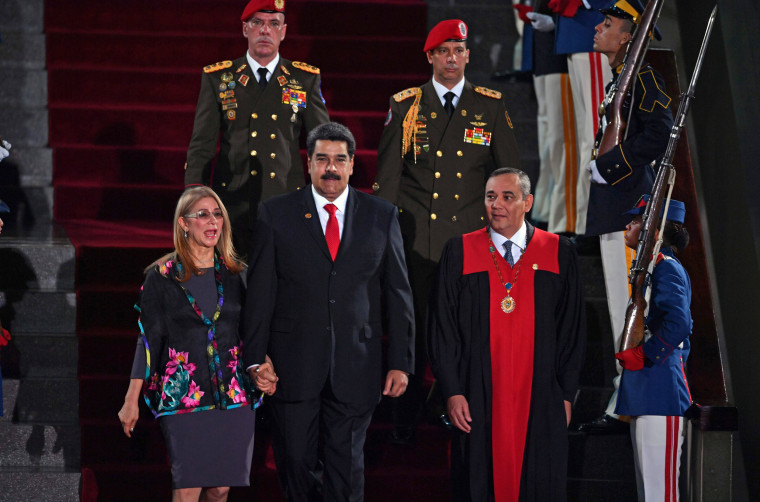MIAMI — President Nicolás Maduro of Venezuela takes the oath of office on Thursday for a second, six-year term, as the country collapses and international condemnation intensifies of what critics call illegitimate and authoritarian rule.
Maduro, 56, was narrowly elected after his mentor, left-wing firebrand Hugo Chavez, died in 2013. He was then reelected in May but the election was tainted by allegations of fraud. It was largely boycotted and many popular opponents were banned from running.
Venezuela is becoming increasingly isolated. A dozen Latin American countries and Canada, that form part of the Lima Group, delivered a blistering critique of Maduro on Friday. They agreed to not recognize Maduro as the legitimate leader of Venezuela when he takes office for a second term.
The group also said it would bar Venezuelan officials from traveling to their countries and might impose financial sanctions. They said Maduro should hand over power to the opposition-controlled National Assembly. It’s the only branch of government it recognizes as legitimate.
Politics in Latin America has swung to the right in recent times with the election of leaders like Jair Bolsonaro in Brazil, Colombia’s Iván Duque, and Argentina’s Mauricio Macri.
Newly inaugurated Bolsonaro, often compared to Trump, has taken a particularly tough stance on Maduro.
But missing from the group’s collective statement was Mexico, a founding member of the Lima Group. The new administration of leftist Andrés Manuel López Obrador has maintained a non-intervention policy on Venezuela, reversing years of Mexican pressure on the country and inviting him to his recent inauguration.
The U.S. has stepped up pressure and on Tuesday, the U.S. Treasury Department announced new sanctions targeting seven people and two-dozen corporate entities, citing an alleged currency scheme that enriched administration officials.
During a trip to Brazil last week, Secretary of State Mike Pompeo said he and Brazilian Foreign Minister Ernesto Araujo discussed their “deep desire” for Venezuela to return to democracy. He also pledged support for allies in South America as they respond to the crisis in Venezuela.
Opponents of Maduro have been urging stronger action from the Trump administration, such as a ban on oil purchases from Venezuela or designating the government a state sponsor of terrorism.
”It’s important that other countries implement sanctions,” said Jason Marczak, director of the Atlantic Council's Adrienne Arsht Latin America Center, adding that countries in Europe have been reluctant to do so.
Outside pressure is “necessary but it is hardly sufficient,” cautions Frank Mora, a former Pentagon official who now heads Florida International University’s Latin America and Caribbean Center. He said there needs to be an effort on the part of domestic actors to truly find a way out of the crisis. Maduro’s government has a “certain level of resiliency,” Mora said.
The Venezuelan leader often accuses Washington of trying to topple his “socialist revolution” and waging an economic war against the country.
Trump said over a year ago the U.S. was considering a military option for Venezuela and since then, the idea of using force to topple Maduro has swirled among some, like Florida Republican Senator Marco Rubio. But many experts say it is not likely to occur.
Mora said although it may seem easy to topple the government “it’s not just about getting rid of the regime, it’s much more complicated... when you break it, you own it, so the U.S. would have to occupy Venezuela with at least 150,000 troops until stability and order can be restored."
"I don’t see this as a priority within the Department of Defense," he said.
Once, one of the wealthiest nations in Latin America, Venezuela is going through a crisis of historic proportions after two decades of socialist rule. Shortages in food and medicine have left Venezuelans hungry and dying of preventable diseases. Many struggle to pay for already scarce food and medicine because of the country’s seven-digit inflation. In recent years, over 3 million Venezuelans have fled to neighboring countries as well as the U.S.
Despite the humanitarian crisis, in a New Year’s Eve tweet, Maduro sent a positive message saying 2019 will be a year of “advancements and prosperity.” He said he wishes “love, peace, and happiness,” for Venezuela.
But the future of Venezuela remains uncertain and bleak. Efforts at a dialogue between Maduro and the opposition have failed in the past. Massive anti-government protests that filled the streets in 2017 have not resurfaced after a violent crackdown that left over 100 dead.
Many opposition leaders are either in prison or exile. High-level defections are not rare. One Supreme Court justice and government loyalist, Christian Zerpa, fled to the U.S. just days before the inauguration. “This has no other name than a dictatorship,” he said at a news conference.
“Venezuelan people do not see the opposition as a viable alternative. That’s not to say they like Maduro … But what is the alternative? What we are seeing is that the alternative is to leave the country rather than to rally around the opposition, a party, or an agenda to find a way out of this crisis,” Mora said.



